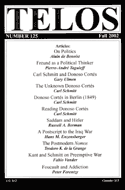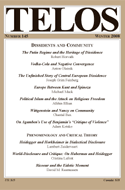Each Tuesday in the TELOSscope blog, we reach back into the archives and highlight an article whose critical insights continue to illuminate our thinking and challenge our assumptions. Today, Philip Crone looks at Fabio Vander’s “Kant and Schmitt on Preemptive War,” from Telos 125 (Fall 2002), and Michael Mack’s “Toward a Redefinition of Europe’s Political Identity: Spinoza’s Non-hierarchical Vision,” from Telos 145 (Winter 2008).
In the wake of the terrorist attacks of September 11, President Bush addressed a joint session of Congress, announcing the global war on terrorism and articulating the Bush doctrine of preemptive military action. His speech was followed shortly by the American-led invasion of Afghanistan, and a year later his administration began to make its case for war against Iraq. The formal campaign for the war began with President Bush’s address to the UN Security Council on September 12 and eventually led to the adoption of UN Security Council Resolution 1441, which called for “serious consequences” should Iraq not comply with weapons inspections.
 As the Bush administration made its case for war at the United Nations, in discussions with potential allies and before the American public, popular opinion was severely divided between pro- and anti-war factions. One of the key issues under contention was the Bush doctrine’s call for preemptive war, and as the Bush administration made its case for preemptive war, Fabio Vander examined the contentious issue and its treatment by Immanuel Kant. Kant had a very narrow vision of the cases in which preemptive war could be legitimate. In particular, “preemptive war presupposes (and upholds) international lawlessness” for Kant because such war can only occur in the lawless “state of nature.” In fact, for Kant all war takes place in such a “state of nature,” with the exception of particular wars necessary to escape the “state of nature” in which lawlessness abounds. The seemingly paradoxical task is how to “[conduct] war according to principles, which always allows it to overcome this state of nature of states in their external relations in order to become a juridical state.” For Kant, these “principles” rule out either a “punitive war” or a “war of extermination.” The solution to the problem for Kant is to consider the situation of an “unjust enemy”:
As the Bush administration made its case for war at the United Nations, in discussions with potential allies and before the American public, popular opinion was severely divided between pro- and anti-war factions. One of the key issues under contention was the Bush doctrine’s call for preemptive war, and as the Bush administration made its case for preemptive war, Fabio Vander examined the contentious issue and its treatment by Immanuel Kant. Kant had a very narrow vision of the cases in which preemptive war could be legitimate. In particular, “preemptive war presupposes (and upholds) international lawlessness” for Kant because such war can only occur in the lawless “state of nature.” In fact, for Kant all war takes place in such a “state of nature,” with the exception of particular wars necessary to escape the “state of nature” in which lawlessness abounds. The seemingly paradoxical task is how to “[conduct] war according to principles, which always allows it to overcome this state of nature of states in their external relations in order to become a juridical state.” For Kant, these “principles” rule out either a “punitive war” or a “war of extermination.” The solution to the problem for Kant is to consider the situation of an “unjust enemy”:
An “unjust enemy” for Kant is one who resists going from the “state of nature” to the “juridicial state.” At first sight, even this is problematic, even redundant, because “the state of nature is itself an unjust state,” and all subjects in it (friends and enemies alike) are “unjust.” But the redundancy disappears when one considers that here Kant is dealing with another “border situation” . . . because it is not a question of two enemies in the “state of nature” . . . but of one who tries to overcome this condition, while the other opposes the restoration of legality and politics.
Thus, in the presence of international law, states may only engage in conflicts against such “unjust enemies” in order to overcome the “state of nature.” Such conflicts not only preclude preemptive war, but also “punitive wars” and “wars of extermination.”
Vander is not only interested in the Kantian conception of the “unjust enemy” and its relation to preemptive war, but also, more importantly, in Carl Schmitt’s misunderstanding of these concepts. Furthermore, Vander links the Bush administration’s rationale for preemptive war to Schmitt’s misunderstanding of the “unjust enemy.” Schmitt sees Kant’s use of the term “unjust enemy” as discriminatory, as judging one state as superior to another in a conflict, but without understanding the key distinction between “just” and “unjust” in this context—the fact that one belligerent seeks to uphold law while the other seeks to preserve the “state of nature.” Schmitt dismisses the Kantian distinction and the Kantian limits on military action. Schmitt’s goal, according to Vander, “is to homogenize all subjects and to cancel all differences.” By this rationale, “any ‘war between states, between equal sovereigns [is] legitimate.'” The comparison to contemporary geopolitics is striking, as Vander makes clear:
But today there is also talk of “rogue states,” against which war would not only be “just,” but there would even be the right to fight without limits; where not having limits means that “war is legitimate even when it is “preemptive.” . . . Preemptive war must be condemned and eliminated, not by rejecting—as Schmitt does—the underlying problem, i.e., the reality of an “unjust enemy” (today, terrorists), but by rejecting the preemptive-punitive war as the best solution, i.e., the doctrine according to which the “unjust enemy” can be eliminate only if democracy—the West, the civilized world—interjects its most characteristic paradigm: criminal logic and the aggressive charge that drives it.
Of course, even if we accept Vander’s conclusions, questions abound. In particular, what kind of action should be taken against “unjust enemies,” against terrorists, if not “preemptive-punitive war”? In the run-up to the war against Iraq, much was made of the reluctance of many European states, particularly France and Germany, to resort to war. Could the actions of these European states be seen as a model for engagement with threats in the future?
 Michael Mack wrote in Telos 145 about how European geopolitics has indeed been construed as Kantian. “Strangely enough,” Mack observes, “Kant still serves to represent not only ‘the good German’ but also ‘the good European.'” Mack makes note of Robert Kagan’s essay “Of Paradise and Power,” which associates American military force with a Hobbesian “state of nature,” whereas European preference for “formal proceduralism in international relations” is more Kantian. Mack takes issue with this characterization, particularly since both Hobbes and Kant had similar conceptions of a lawless, violent “state of nature.” Mack makes the case that the current reluctance to engage in military action by European powers is the intellectual descendent of Spinoza, rather than Kant:
Michael Mack wrote in Telos 145 about how European geopolitics has indeed been construed as Kantian. “Strangely enough,” Mack observes, “Kant still serves to represent not only ‘the good German’ but also ‘the good European.'” Mack makes note of Robert Kagan’s essay “Of Paradise and Power,” which associates American military force with a Hobbesian “state of nature,” whereas European preference for “formal proceduralism in international relations” is more Kantian. Mack takes issue with this characterization, particularly since both Hobbes and Kant had similar conceptions of a lawless, violent “state of nature.” Mack makes the case that the current reluctance to engage in military action by European powers is the intellectual descendent of Spinoza, rather than Kant:
Contrary to his geometrical method, the content of Spinoza’s thought is filled with uncertainty. This is why he tolerates religion within a secular state, refraining from opting for the absolute supremacy of any one entity. Instead, he argues for the coexistence of different ways of life. . . . It is this pluralistic and non-hierarchical aspect of his theology that makes Spinoza a more appropriate philosopher of postwar Europe than Kant. As Kagan himself acknowledges, the quasi-Kantian politics of peace is itself dependent on Hobbesian war. Spinoza, however, envisages a world that does without hierarchical divisions (be they racial, religious, economic, etc.) that give rise to violence in the first place. Whereas Hobbes and Kant opt for certainty in their respective political philosophies, Spinoza allows for uncertainty and difference.
Mack connects this allowance for uncertainty and difference to Spinoza’s critique of teleological conceptions of God. Humans conceive of God as human-like in the sense that God has some end goal, some telos. This teleological theology gives rise to teleological thought in general:
The anthropomorphic, i.e., teleological, conception of God . . . lays the foundation for violence and ethnocentric discrimination within society itself. Teleological thought pitches the telos of one community against that of another.
Spinoza is interested in undercutting the claims of any one community’s telos, thus allowing for different social arrangements to coexist peacefully. Is this truly the current approach of European geopolitics? If so, how is this reconciled with European action in Afghanistan, which is ostensibly a nation-building effort that is teleologically driven towards a Western-inspired outcome? Regardless of its accuracy in describing the current geopolitical outlook in Western Europe, is Spinozan pluralism a potential template for future conflicts? Or is the Kantian notion of the “unjust enemy” a better model?
Read the full version of Fabio Vander’s “Kant and Schmitt on Preemptive War” and Michael Mack’s “Toward a Redefinition of Europe’s Political Identity: Spinoza’s Non-hierarchical Vision” at the TELOS Online website. If you are affiliated with an institution that is an online subscriber to Telos, you have free access to our complete online archive. If not, you can purchase 24-hour access to this and other Telos articles at the low rate of $5/article.








